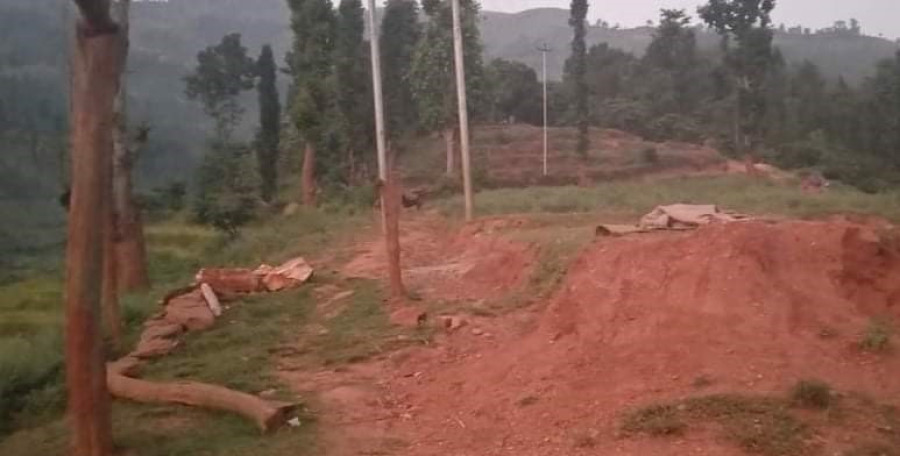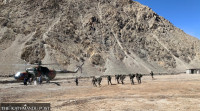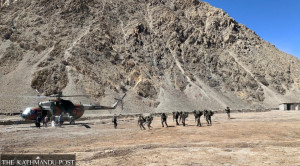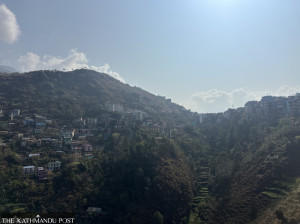Karnali Province
Dailekh locals accuse local units of misusing coronavirus funds
Despite the high expenditure, the local units did not deliver on their promise, say locals.
Jyotee Katuwal
The local units in Dailekh had built quarantine and isolation centres to hold the large number of returnees entering the district every day and had organised drives to distribute relief packages. But locals say that the local units failed to deliver on both accounts; the quarantine centres were mismanaged and the relief packages never reached those in need.
Man Bahadur Shahi, a 35-year-old local, has been struggling to make ends meet for his family of six. A local of Ward No. 1, Shahi says that his name never came up on the list of those eligible for relief.
“I ran out of savings some months ago and I still don’t have an income. The local representatives came to our neighbourhood to distribute relief but I wasn’t among the beneficiaries,” Shahi said.
“The rural municipality distributed relief materials to those who weren’t in need of them and left out impoverished families,” said Maina Bahadur Thapa, a local of Ward No. 1. “The pandemic has become a source of income for people’s representatives and government employees in the rural municipality.”
According to the data provided by the District Coordination Committee, 11 local units in the district spent around Rs 215.5 million meant as Covid-19 fund in the last few months. The data also reflects discrepancies in the budget used by the local units while managing quarantines, food grains, clothes and equipment, among others, against the Public Procurement Act.
Mahabu Rural Municipality spent around Rs 30 million on transportation, medical equipment purchase and food grains in the last six months.
The rural municipality distributed relief to 600 families in Ward no. 1 but locals say that the relief materials did not reach the needy families. They allege that the Ward Chairman Hari Prasad Upadhyay used the funds to keep his own vote bank happy.
Kamal Thapa, another local, said the rural municipality did not seek a fair price in the market while buying food grains and other materials for the relief packages.
“Grocery items worth a million rupees were purchased from the same shop without any quotation. Around Rs 300,000 was spent on 2,700 individuals. That amount would have been enough to feed more families,” he said.
Ramesh Kumar Dasaudi, chief at the Health Section of the rural municipality, said, “We have so far received receipts for expenditure worth Rs 27.6 million and cleared the bills.”
Narayan Municipality spent Rs 43.6 million to contain the spread of the coronavirus. Resham Budha, acting chief administrative officer of the municipality, said, “The municipality had to spend such a huge amount of money because we had to purchase a PCR machine and other supportive medical equipment. We also had to build the necessary infrastructure and purchase food grains and manage transportation from the same amount.”
Locals in Bhairabi Rural Municipality also protested after the rural municipality prepared two receipts reflecting the same amount, Rs 200,000, spent on 44 individuals and 200 individuals in quarantines in Ward No. 6 and 7.
In the last eight months, around 15,000 individuals entered Dailekh from various parts of the country and abroad. The local units claim that they spent the funds to manage returnees in quarantine centres.
Dullu Municipality spent Rs 23.2 million, Chamundabindrasaini Municipality spent Rs 17.9 million, Aathbis Municipality spent Rs 17.7 million, Bhagawatimai spent Rs 8.7 million, Thatikadh spent Rs 15 million, Dugeshwor spent Rs 13 million, Naumule spent Rs 23.2 million, Gurans spent Rs 11 million and Bharabi spent Rs 14.3 million for coronavirus control and prevention in the last few months, the data provided by the local units showed.
Despite the high expenditure, the local units failed to meet the standard required to run isolation and quarantine facilities, says Prem Thapa, chief at the District Coordination Committee. “The quarantine and isolation centres of the local units were poorly managed. They seem to have spent money unnecessarily. There are many receipts which show transactions being done in millions but there is nothing to show for it,” he said. “The majority of the bills were paid violating the Public Procurement Act. Some bills submitted by the local units don’t add up to the amount they claim to have spent.”




 14.24°C Kathmandu
14.24°C Kathmandu













